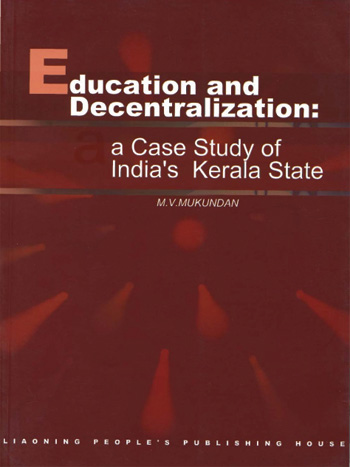Other Books Published by CERC
Education and Decentralization: a Case Study of India’s Kerala State

M.V. Mukundan
ISBN 7-205-05817-1
(November 2004, 293pp.)
HK$80 (local), US$12 (overseas)
Publisher: Liaoning People’s Publishing House
Available from Comparative Education Research Centre,
The University of Hong Kong
In nearly all countries of the world, the locus of control of education has been in contention over the years. Questions include whether power should be concentrated or distributed among parts of a system, and who should make decisions about what. A shift in control affects the continuity and change in the provision and delivery of services at various levels and in different sectors within that system. The pitfalls of centralized control are often characterized as failures in promoting development and reduction of poverty. This has compelled many countries to experiment with types of decentralization. However, changes sometimes operate only at the level of rhetoric rather than reality.
India embarked on a nationwide democratic decentralization programme through the 73rd Constitutional Amendment in 1992. Known as the Panchayati Raj, this programme envisaged the strengthening of Local Self Government Institutions (LSGIs) with a three-tier system – District, Block, and Village Panchayat – in each state. Kerala, the southwestern coastal state in India, claims to have implemented far-reaching decentralized planning in different sectors including education. This thesis is anchored in the question how the politics of decentralization did or did not affect primary education in Kerala Between the 1996 introduction of the People’s Campaign for Decentralized Planning (PCDP) and 2002. The decentralization initiative which is examined in this study is a state level development policy intended for the transformation of the entire state administration. It was introduced within a “big bang” approach and abrupt transfer of powers and resources. The thesis explores the implementation of policy with particular reference to the LSGIs. The ex post facto qualitative study is conducted in the form of a cross-district comparative case study. Within a multilevel comparative framework, the study documents the continuities and changes in the field of primary education in two districts of Kerala, namely Kannur and Kasaragod. One district may be considered typical of the state as a whole, while the other hand been a focus for particular innovation through the central-government-supported District Primary Education Programme (DPEP).
The accountability and effectiveness of decentralization in the education system is examined within a comprehensive framework which consists of seven important aspects: finance, auditing and evaluation, regulation and policy development, demand driven mechanisms, democratic mechanisms, service provider choice, and civil service and management system. The different conceptual analysis includes focus on the inter-relations between different aspects of performance accountability, and therefore between different functions and responsibilities distributed across different levels of government. The thesis notes the implications of the politics of decentralization in Kerala. Drawing on the vast literature, and confirming certain technical and theoretical perspectives on the concept of decentralization, this study extends explorations which address the possible pros and cons of a bottom-up approach.
Worldwide, recent decades have brought numerous examples of political and administrative reforms. The majority of these reforms bear the label of decentralization. In most cases, the political elites being the policy designers and implementers justify the intents of these changes by exemplifying and reifying isolated examples of successes. Delving into the political and developmental linkages of the decentralization initiative in Kerala, this study distinguishes the dichotomy between rhetoric and reality related to the concept of decentralized control.
Contents:
Foreword by Mark Bray
Chapter 1 Introduction
Chapter 2 Control, Continuity and Change
Chapter 3 India: History, Politics, Society, and Education
Chapter 4 Kerala: Features and Developmental Path
Chapter 5 Choice of Methods and Approaches
Chapter 6 Kannur District: History, Politics, Society and Education
Chapter 7 Kasaragod District: History, Politics, Society and Education
Chapter 8 Decentralized Control: Realities Defying Rhetoric?

